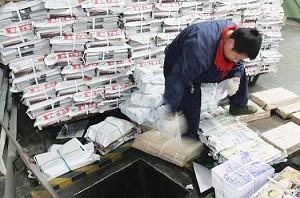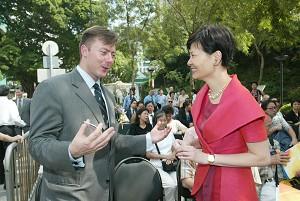CHONGQING, China — On October 7, over 1,000 police officers seized Chongqing’s Shuangbei Garden, where several thousand sacked workers of the state-owned Chongqing Special Steel Co. Ltd. had been peacefully protesting, demanding unpaid wages, severance payments, and investigation into the company’s corruption. Eye witnesses say the police savagely beat the protesters, and many were seriously injured. At least two women and a child of 7 or 8 years old died afterward.
According to Mr. Chen, one of the protesters interviewed by Radio Free Asia, at around 6:30 a.m. a small number of police officers arrived at the garden and arrested the workers’ representatives. Two hours later, he said, over 200 plain-cloth police who pretending to be sacked workers came and turned two police vans over. In no time, over 200 riot police rushed to the scene and started beating people brutally and indiscriminately. The child who died under the beatings was said to be beaten upon asking, “Why would the uncle police beat people?”
Chen said that by 10:30 a.m. over 1,000 police and public security officers had jammed the garden and its proximity. But other eye witnesses claimed that there could have been as many as 3,000 police officers.
Corruption Plagues State-owned Enterprise
Before it went bankrupt in July, the Chongqing Special Steel Co. Ltd. was a 70 years old huge state-owned enterprise. At its prime, the company had as many as 18,000 employees and was called “the mother of all industries in southwest China.” The company’s financial crisis was first exposed in early 1997 when it failed to pay its workers for five consecutive months. Until that time, the workers were told that the company was making profits.
In the following years, workers were laid off without compensation; those who stayed were often paid late or not given reimbursement for their medical bills.
The workers believe that the Chongqing Special Steel’s bankruptcy was mainly caused by corruption and corruption-related mismanagement. In 1990, the company spent over 200 million yuan (about US$25 million) purchasing a second-hand machine, which was broken and useless three years later. Another expensive machine was brought from Germany around the same time and was never put in service.
Many of the company’s transactions are questionable, say the workers. The company frequently purchased materials at prices higher than the market rate or sold its products at surprisingly low prices.
The grievance of Chongqing Special Steel’s workers is by no means a special case. A month after the workers had started their protest, they were joined on Sept. 1 by sacked workers of two other companies—China’s Eighteenth Metallurgy Company and Jialing Company, on Sept 1.
Clean Up and Cover Up
The crackdown happened just one day before the fifth plenary session of the 16th Central Committee of the Chinese Communist Party (CCP) was to meet in Beijing, and four days before the fifth Asia Pacific Cities Summit was to be held in Chongqing. The CCP regularly “cleans up” any signs of protest in preparation for important events or “sensitive” occasions that would likely attract the media’s attention.
This is the first time China has hosted the Asia Pacific Cities Summit. News agencies and reporters from around the world are now in Chongqing reporting on the event. But apparently all government employees in Chongqing are extremely cautious about not “leaking” any information about the Oct. 7 crackdown, to the extent that many of them even refuse to speak about the Summit.
Part of the CCP’s strategy involves providing a justification for the crackdown after the fact. According to residents in Chongqing, the CCP’s local media are saying it was the workers that turned over police vans and that at least a dozen police were injured in the workers’ riot. The workers say it was the police who rioted.
Many injured protesters are still hospitalized, but the hospitals refuse to offer information about them.
The Asia Pacific Cities Summit began on Oct. 11 and ends on Oct. 14. Now the Shuangbei Garden is quiet and clean. A large number of police and public security officers continue to be stationed there and patrol around the city of Chongqing.

